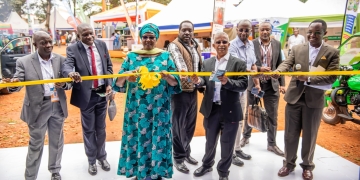
NAMULONGE, Uganda – Minister for Agriculture, Animal Industry and Fisheries Frank Tumwebaze on Friday challenged agricultural research institutions to enhance their public engagement efforts, emphasizing the importance of effectively communicating scientific advancements to the wider population.
Speaking at an annual agribusiness exhibition held at the National Crops Resources Research Institute (NaCRRI) in Namulonge, Wakiso district, Tumwebaze stressed that while significant strides are being made in agricultural research, these breakthroughs must be understood and embraced by farmers and the general public to achieve their full potential.
“The research you conduct is the bedrock of our food systems,” Tumwebaze stated. “However, the impact of this vital work is limited if the knowledge and technologies developed do not reach and resonate with the intended beneficiaries – our farmers and the citizens who depend on agriculture.”
Tumwebaze specifically highlighted the crucial role of research institutions in propagating high-quality seeds and developing resilient, disease-free, and environmentally friendly foundation seed. He underscored the government’s continued commitment to supporting these institutions, recognizing their fundamental contribution to national food security.
The minister acknowledged the ongoing need for more researchers across various agricultural disciplines and affirmed the government’s efforts to increase the number of skilled personnel within these institutions. He implied that alongside increasing research capacity, a parallel effort to improve public understanding of their work is equally important.
Tumwebaze’s remarks came during an event championed by the National Agricultural Research Organisation (NARO) in partnership with the Eastern Africa Grain Council (EAGC) and DANIDA Green Business Partnerships (DGBP). The exhibition focused on the sustainability of food systems in Uganda, climate-smart agriculture trade, and wealth creation – all areas heavily influenced by agricultural research.
Dr. Sadik Kassim, the deputy director of NARO, outlined the organization’s mission to build resilience in the agriculture sector through the development of drought, pest, and disease-tolerant crop varieties. He also detailed NARO’s work in enhancing nutrition, contributing to agro-industrialization, pursuing import substitution, and increasing export volumes. These advancements, Dr. Kassim’s presentation suggested, are the very developments Minister Tumwebaze wants to see more effectively communicated to the public.










Discussion about this post